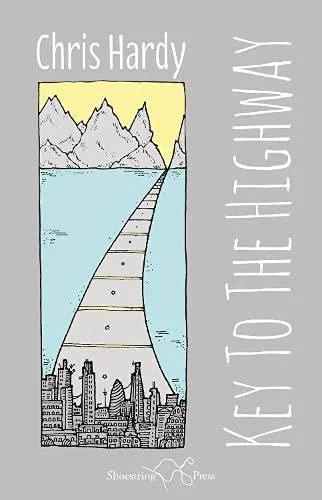Chris Hardy’s latest collection Key to the Highway maps a journey from the poet’s early years to later life – a coming of age that spans seasons and continents, city life and the natural world - its ‘jungle and savannah’, its hornbills, snakes and hawks – to examine, ultimately, what remains. Each poem is deftly realised in language that, focused in vivid and often surprising images, shapes compelling narratives that turn to reveal their unexpected lining. ‘Only later’, the poet writes, ‘can you make out /how it all went together’ (‘Number One’).
A characteristic sensitivity to surface begins in the childhood poems with microscopic attention to detail, ‘drops of rain/with a red speck of sand inside each’ which look, to the child, ‘like an ant in amber on my shoes’ (‘Naming Rain’), but both the long reach of time and its brevity are never far away. A childhood photograph, in ‘Number One’, reveals that
we are looking at the lens
which looks straight back
as it buries us alive
while children ‘kneeling on the seat / looking back’ meet ‘their lives pouring in / through the windscreen behind them’ (‘Behind the Sun’).
In Hardy’s realisations of the past, memory seems convincing and reliable, the specificity of images made resonant through echoes of sound. ‘A square of Nottingham lace’ lies ‘upon the locked piano lid’, or there is the vividness of ‘sharp grass, simmering with / centipedes and ants’. More heady atmospheres evoke the ephemeral beauty of nature, where ‘scented air’ can ‘fill the house with sleeping fields and hedgerows’, but the poems retain a powerful sense of physicality, rooted in time and place. Thus ‘how hot it was last summer’, the poet tells us in ‘Crossing the Threshold’, the voice anecdotal with an ease that invites us into a kind of a memoir, conceived as a series of stepping stones. In this way time itself is brought into view again, how we survive the years ‘of diaries, rents, the morning / and the evening key’ (‘Lord Dismiss Us’) or feel their pull, as in ‘Near Clun’:
if you stop
above a river
where you stand is always
running away
beneath you.
At other times Hardy make clear that this linearity is also an illusion. There are detours, lateral turns, both of experience and thought, and a questioning of memory itself, as in ‘Lord Dismiss Us’, where the poet asks,
And why do I
this afternoon recall
when we were last together?
There is the sudden magic of timing, the moment that defines a destiny, most keenly explored in the tension between words and music – ‘what words can only say’ opposed to the discovery, in the title poem,
of the long beat loose
inside a handmade chord,
which unlocked the door
to the highway,
where music stops everything, while simultaneously carrying it forward on its inner rhythms. But language is also shown to be an integral part of the rhythm of time, playing with and shifting our perception. In one moment, it secures a reality for specific names and shapes, at others sets them loose for recalibration: ‘Winter will not come this year, / maybe never’ (‘Earth Rise, July 20th 1969’), a brief triumph set against the unsettling image, in ‘Defeat’, of ‘weather to make the grass grow quick / so it must be cut, and cut again’, with its echoes of Larkin. Cut grass lies frail, but in the midst of these larger seasons, ‘waterfalls of stars fall through the skylight’ (‘Dragon’s Tail’).
Although the collection ends, in ‘Did You Make It?’, on a questioning and deeply elegiac note, Hardy’s collection also animates the round of day and night, the rhythms of ‘dawn to dusk’, to create images of quiet beauty that linger, like the moon making and unmaking ‘its round silver self’, ambiguous but enduring.
